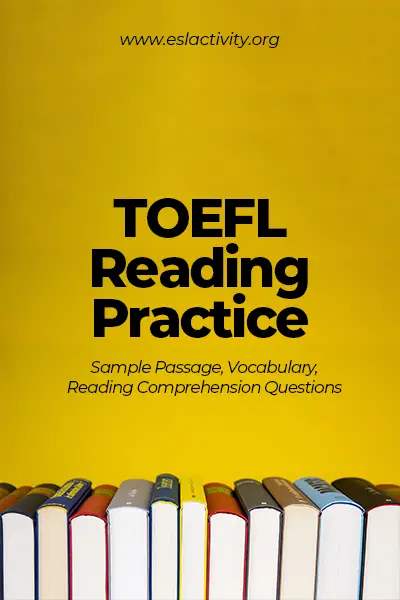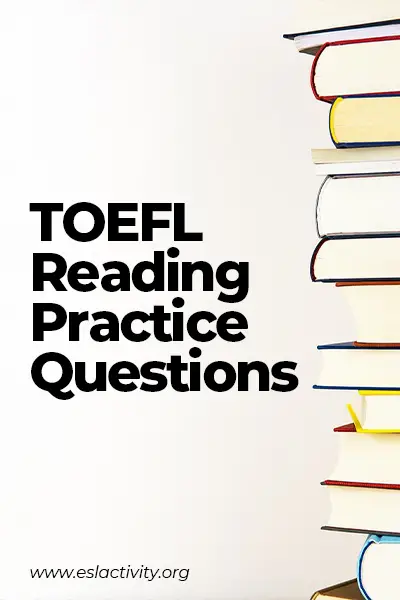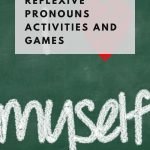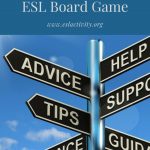If you are preparing for the TOEFL Reading exam and looking for practice materials, you might have come across our top 15 tips for TOEFL reading. We emphasized the importance of practising, but finding the right resources can be difficult. That’s why we have designed this free reading practice activity to offer you a holistic approach to tackling the challenges of the TOEFL Reading exam.

TOEFL Reading Exam
The TOEFL Reading exam is designed to test your proficiency in English reading comprehension. Typically, the exam consists of three to four academic passages covering diverse subjects such as science, history, social sciences, and literature. Each passage is followed by a set of multiple-choice questions that evaluate your ability to grasp main ideas, infer information, and comprehend vocabulary in context.
The purpose of the exam is not only to test your memory but also to assess your analytical and critical thinking skills when engaging with complex written material. If you are an ESL student, mastering the intentional blend of academic disciplines and enhancing your ability to navigate through diverse texts will undoubtedly contribute to a more confident and successful performance in the TOEFL Reading exam.
TOEFL Reading Practice
Following is an example reading exercise. It is similar to what you will have to read on the actual TOEFL exam.
TOEFL Reading Example Passage
Read the passage, learn the vocabulary, and try to answer the questions to test your understanding.
Title: Exploring the Depths of the Human Mind
Understanding the complexities of human behavior and the intricate workings of the mind is the fundamental pursuit of psychology. As an academic discipline, psychology seeks to unravel the mysteries of thought, emotion, and behavior, providing valuable insights into the essence of what it means to be human. This introductory exploration into psychology serves as a gateway to a diverse and dynamic field that encompasses a myriad of perspectives, theories, and methodologies.
The Definition and Scope of Psychology
Psychology, derived from the Greek words “psyche” (meaning soul or mind) and “logos” (meaning study), is commonly defined as the scientific study of behavior and mental processes. This broad definition underscores the comprehensive nature of the discipline, which extends its reach from the observable actions of individuals to the intricate processes occurring within the mind.
The scope of psychology is vast, encompassing a wide array of subfields such as clinical psychology, cognitive psychology, developmental psychology, social psychology, and more. Each subfield focuses on specific aspects of human behavior and cognition, contributing to the richness and diversity of psychological knowledge.
Historical Foundations
To comprehend the evolution of psychology, it is essential to delve into its historical foundations. Psychology’s roots can be traced back to ancient civilizations, where philosophers pondered questions related to the mind and behavior. However, it was in the late 19th century that psychology emerged as a formal discipline with the establishment of Wilhelm Wundt’s experimental psychology laboratory in Leipzig, Germany, in 1879. Wundt’s emphasis on the scientific study of consciousness laid the groundwork for the systematic exploration of psychological phenomena.
The subsequent decades witnessed the development of various schools of thought, each offering unique perspectives on the mind and behavior. From Sigmund Freud’s psychoanalytic theory, which delved into the unconscious mind, to John B. Watson’s behaviorism, which focused on observable behaviors, the early years of psychology were marked by a diversity of theoretical approaches.
Modern Perspectives
Contemporary psychology has evolved into a multifaceted discipline, embracing a range of perspectives that reflect the complexity of human nature. The psychodynamic perspective, influenced by Freud’s work, continues to explore the unconscious mind and the impact of early experiences on behavior. The behavioral perspective emphasizes the role of observable behaviors and environmental influences in shaping individuals.
Cognitive psychology, on the other hand, investigates mental processes such as memory, perception, and problem-solving. Humanistic psychology emphasizes personal growth, self-actualization, and the pursuit of one’s potential. The social-cultural perspective examines the influence of cultural and social factors on behavior, recognizing the interconnectedness of individuals within their societal contexts.
Research Methods in Psychology
The scientific nature of psychology is manifested through rigorous research methods employed to investigate hypotheses and validate theories. Researchers utilize various approaches, including experiments, surveys, case studies, and observational studies, each tailored to address specific research questions. The scientific method is a cornerstone of psychological inquiry, promoting systematic observation, data collection, analysis, and interpretation.
The Application of Psychological Knowledge
Psychology is not only an academic pursuit but also a discipline with real-world applications. Clinical psychologists apply their understanding of mental health to diagnose and treat psychological disorders, while counseling psychologists assist individuals in coping with life’s challenges. Industrial-organizational psychologists contribute to workplace efficiency and employee well-being, and forensic psychologists apply their expertise to legal and criminal justice settings.
The Role of Nature and Nurture
A central debate within psychology revolves around the relative contributions of nature and nurture to human development. The nature-nurture debate explores the interplay between genetic factors (nature) and environmental influences (nurture) in shaping individual differences. Contemporary perspectives recognize the intricate interaction between genetics and environment, highlighting the dynamic and reciprocal nature of developmental processes.
Conclusion
In conclusion, this introduction merely scratches the surface of the vast and dynamic field of psychology. From its historical roots to the contemporary perspectives and diverse applications, psychology offers a captivating journey into the intricacies of the human mind. As we embark on this exploration, we invite you to delve deeper into the rich tapestry of psychological knowledge, where the quest to understand the complexities of human behavior unfolds with every discovery and inquiry. Through the lens of psychology, we gain valuable insights that not only inform our academic endeavors but also enhance our understanding of ourselves and the world around us.
Vocabulary List
Review the important words that appeared in the reading passage.
- discipline: A field of study or branch of knowledge, in this context, referring to the systematic study of human behavior and mental processes.
- perspectives: Different viewpoints or approaches used to understand and interpret psychological phenomena, such as the psychodynamic, behavioral, cognitive, humanistic, and social-cultural perspectives mentioned in the passage.
- methodologies: The systematic procedures or techniques employed in research, including experiments, surveys, case studies, and observational studies, to gather and analyze data in psychology.
- foundations: The fundamental principles or origins upon which a particular field, in this case, psychology, is built and developed, encompassing historical roots and foundational theories.
- cognition: The mental processes involved in acquiring, processing, storing, and using information, a key focus of cognitive psychology mentioned in the passage.
- psychoanalytic theory: A psychological perspective, pioneered by Sigmund Freud, that emphasizes the role of the unconscious mind, childhood experiences, and the interplay of conscious and unconscious forces in shaping behavior.
- behaviorism: A school of thought in psychology, associated with John B. Watson, that focuses on the study of observable behaviors and the influence of environmental factors on behavior.
- humanistic psychology: A psychological perspective that emphasizes individual potential, personal growth, and the pursuit of self-actualization as essential aspects of human experience.
- nature-nurture debate: A longstanding discussion within psychology exploring the relative contributions of genetic factors (nature) and environmental influences (nurture) to human development and behavior.
- scientific method: A systematic approach to research characterized by observation, hypothesis formulation, experimentation, data collection, analysis, and interpretation, used in psychology to study and understand various phenomena.
Vocabulary Quiz
Try answering the questions and check your answers. If you make a mistake, review the vocabulary list again.
Questions
- Myriad, in the first paragraph is closest in meaning to:
- a) a variety
- b) a very large number
- c) a few
- d) a number of
- Intricate, in the second paragraph is closest in meaning to:
- a) simple
- b) unknowable
- c) complicated
- d) mysterious
- Delve, in the fourth paragraph is closest in meaning to:
- a) excavate
- b) learn a bit about something
- c) go
- d) thoroughly research
- Consciousness, in the fourth paragraph is closest in meaning to:
- a) action
- b) reason
- c) awareness
- d) morality
- Theoretical, in the fifth paragraph is closest in meaning to:
- a) based on ideas
- b) based on experience
- c) based on observation
- d) practical
Answers
- b
- c
- d
- c
- a

TOEFL Reading Comprehension Questions
The following multiple choice questions are designed similarly to what you will see on the actual TOEFL Reading exam. Answers can be found at the end of the list of questions.
Questions
- What is the definition of psychology?
- a) The study of ancient civilizations
- b) The exploration of conscious experiences
- c) The examination of environmental influences
- d) The scientific study of behavior and mental processes
- Who established the first experimental psychology laboratory in Leipzig in 1879?
- a) John B. Watson
- b) Wilhelm Wundt
- c) Sigmund Freud
- d) B.F. Skinner
- Which psychological perspective emphasizes the unconscious mind and the impact of early experiences on behavior?
- a) Cognitive psychology
- b) Humanistic psychology
- c) Psychoanalytic theory
- d) Behaviorism
- What is a cornerstone of psychological inquiry that involves systematic observation, data collection, analysis, and interpretation?
- a) Philosophical method
- b) Experimental design
- c) Scientific method
- d) Observational approach
- Which perspective in psychology focuses on observable behaviors and environmental influences?
- a) Psychodynamic perspective
- b) Behavioral perspective
- c) Cognitive perspective
- d) Humanistic perspective
- Which term refers to the interplay between genetic factors and environmental influences in shaping individual differences?
- a) Nature-versus-nurture argument
- b) Genetic determinism
- c) Environmental determinism
- d) Nature-nurture debate
- What is the central debate in psychology regarding human development and behavior?
- a) Nature-nurture debate
- b) Historical foundations
- c) Scientific methodologies
- d) Perspectives in psychology
- Which subfield of psychology is concerned with workplace efficiency and employee well-being?
- a) Clinical psychology
- b) Counseling psychology
- c) Industrial-organizational psychology
- d) Forensic psychology
- What term encompasses the fundamental principles or origins upon which psychology is built and developed?
- a) Philosophical roots
- b) Historical foundations
- c) Scientific perspectives
- d) Methodological principles
- Which psychological perspective investigates mental processes such as memory, perception, and problem-solving?
- a) Social-cultural perspective
- b) Cognitive psychology
- c) Behaviorism
- d) Humanistic psychology
Answers
- d
- b
- c
- c
- b
- d
- a
- c
- b
- b

More Reading Questions
If you want to further challenge your reading skills, try answering the following questions. Although the TOEFL Reading exam only consists of multiple-choice questions, practising answering open-ended questions with a short or long answer will help you improve your overall English skills.
- In the historical context of psychology, why is Wilhelm Wundt’s establishment of an experimental psychology laboratory considered significant?
- In the application of psychological knowledge, how might clinical psychologists differ from industrial-organizational psychologists in their respective roles?
- From the various perspectives mentioned, how might a cognitive psychologist approach the study of human behavior differently from a behaviorist?
- Based on the passage, why is the scientific method considered a cornerstone of psychological inquiry, and how does it contribute to the advancement of the field?
- What can be inferred about the evolution of psychology from its historical foundations to the modern-day, considering the development of various schools of thought?
FAQs About TOEFL Reading Practice
Here are some of the most frequently asked questions regarding the TOEFL reading exam practice.
How can I practice TOEFL reading?
The best tip is to practice for the TOEFL reading exam is to practice by going over reading exercises. Try our TOEFL reading practice activity that includes an example reading passage, vocabulary list, vocabulary quiz, reading comprehension questions and answers.
What is the passing score for TOEFL reading?
TOEFL scores are assessed on a scale rather than being classified as pass or fail. The complete score ranges from 0 to 120, with separate scores for Reading, Listening, Speaking, and Writing. Usually, universities and institutions have their own score requirements for admissions. It’s important to verify the specific score expectations of the institution you are applying to since they may have different standards for each section. A higher score is generally preferred for competitive programs, while some institutions may approve a lower score based on the overall application and program requirements.
What are the best TOEFL Reading practice resources?
You can find great TOEFL reading practice resources online. Try getting free resources from blog posts. If you are ready to invest in practice material, check out Amazon books.
What are effective strategies for TOEFL Reading comprehension?
Effective TOEFL Reading strategies include skimming passages, identifying key information, practicing active reading, managing time wisely, building vocabulary, understanding question types, eliminating wrong answers, regular practice, improving time management, and simulating test conditions.
What is the structure of the TOEFL Reading exam?
TOEFL Reading test has 3-4 academic passages followed by multiple-choice questions. The exam assesses the test-taker’s comprehension of main ideas, details, inferences, vocabulary, and text structure. Time management is important to complete the exam in the given timeframe.
Can you recommend TOEFL Reading practice books or materials?
If you’re looking for a good TOEFL Reading practice book, check out the
How can I manage time during the TOEFL Reading section?
To make the most of your time during the TOEFL Reading section, try adopting a strategic approach. Start by quickly scanning the passage to get a general idea of what it is about. Then, prioritize the questions based on their difficulty level and focus on answering the easier ones first to build momentum. Don’t forget to keep an eye on the clock and set a pace for each question. Finally, leave a few minutes at the end of the section to review and revise your answers if needed. By practicing these time-conscious strategies during your TOEFL Reading preparation, you can develop the skills and confidence needed to approach the actual exam with ease.
TOEFL Reading Practice: Join the Conversation
Did you go through our TOEFL reading exercise? How did it go? Let us know in the comments. We’d love to hear from you.




